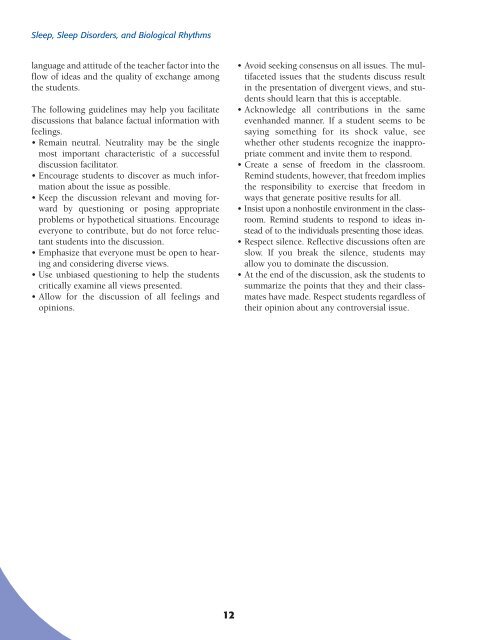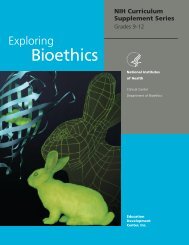Biological - NIH Office of Science Education - National Institutes of ...
Biological - NIH Office of Science Education - National Institutes of ...
Biological - NIH Office of Science Education - National Institutes of ...
You also want an ePaper? Increase the reach of your titles
YUMPU automatically turns print PDFs into web optimized ePapers that Google loves.
Sleep, Sleep Disorders, and <strong>Biological</strong> Rhythms<br />
language and attitude <strong>of</strong> the teacher factor into the<br />
flow <strong>of</strong> ideas and the quality <strong>of</strong> exchange among<br />
the students.<br />
The following guidelines may help you facilitate<br />
discussions that balance factual information with<br />
feelings.<br />
• Remain neutral. Neutrality may be the single<br />
most important characteristic <strong>of</strong> a successful<br />
discussion facilitator.<br />
• Encourage students to discover as much information<br />
about the issue as possible.<br />
• Keep the discussion relevant and moving forward<br />
by questioning or posing appropriate<br />
problems or hypothetical situations. Encourage<br />
everyone to contribute, but do not force reluctant<br />
students into the discussion.<br />
• Emphasize that everyone must be open to hearing<br />
and considering diverse views.<br />
• Use unbiased questioning to help the students<br />
critically examine all views presented.<br />
• Allow for the discussion <strong>of</strong> all feelings and<br />
opinions.<br />
• Avoid seeking consensus on all issues. The multifaceted<br />
issues that the students discuss result<br />
in the presentation <strong>of</strong> divergent views, and students<br />
should learn that this is acceptable.<br />
• Acknowledge all contributions in the same<br />
evenhanded manner. If a student seems to be<br />
saying something for its shock value, see<br />
whether other students recognize the inappropriate<br />
comment and invite them to respond.<br />
• Create a sense <strong>of</strong> freedom in the classroom.<br />
Remind students, however, that freedom implies<br />
the responsibility to exercise that freedom in<br />
ways that generate positive results for all.<br />
• Insist upon a nonhostile environment in the classroom.<br />
Remind students to respond to ideas instead<br />
<strong>of</strong> to the individuals presenting those ideas.<br />
• Respect silence. Reflective discussions <strong>of</strong>ten are<br />
slow. If you break the silence, students may<br />
allow you to dominate the discussion.<br />
• At the end <strong>of</strong> the discussion, ask the students to<br />
summarize the points that they and their classmates<br />
have made. Respect students regardless <strong>of</strong><br />
their opinion about any controversial issue.<br />
12

















